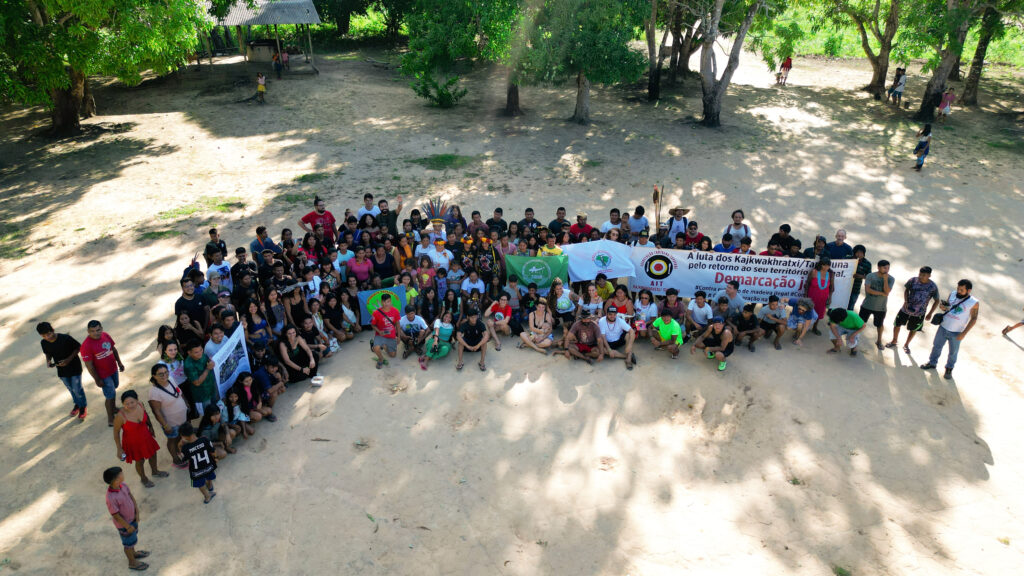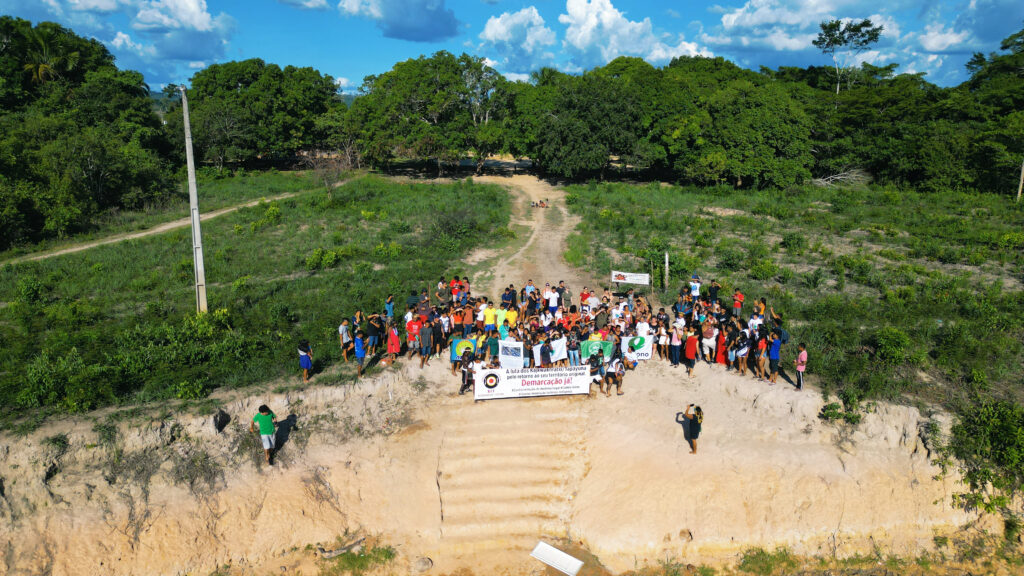We, indigenous peoples and rural communities of the Juruena Basin, social movements, associations and civil society organizations, gathered from November 4th to 7th, 2023, in the Nova Munduruku village, Apiaká-Kayabi Indigenous Land, municipality of Juara-MT, we participated in the 10th Juruena Vivo Festival, under the theme “Connecting territories and adding struggles for good living”.
Reflecting on the struggles, maturity and victories of the Juruena Vivo network during this decade-long trajectory, we recognize ourselves as a collective that positions itself as resistance in the face of projects that affect our territories, traditional ways of life, worldviews and rights.
The network maintains constant monitoring of energy, mining and infrastructure works in the Juruena River basin, generating alerts about its advances and impacts on the territories. This monitoring has been detecting the increase in mining and mining requirements, including overlapping indigenous lands.

We manifest ourselves against the hydroelectric projects in the Juruena basin, raised approximately 180 projects, with emphasis on the Castanheira HPP, Juruena HPP and Mato Grosso, presented as false solutions for the climate crisis and energy transition, but which destroy the life of our rivers and jeopardize the food sovereignty and cultural reproduction of peoples.
We also point out the insufficiency of studies in relation to small hydroelectric power plants (SHPs) and hydroelectric power plants (CGHS), especially the SHPs of the Rio do Sangue, forming a chain of cumulative and synergistic impacts that are undersized in the licensing.
In the name of guaranteeing the subsistence and protection of crops that depend on fisheries in the state of Mato Grosso, we express ourselves by the speed of the action of unconstitutionality of the amendment of Fisheries Law No. 9,096/2009.
It should be noted that several projects in the Juruena Basin do not respect the consultation protocols of the peoples of the region, in addition to not carrying out prior, free and informed consultations, as recommended by Convention 169 of the International Labor Organization (ILO), of which Brazil is a signatory.
We claim that the Federal Public Prosecutor’s Office (MPF) and the Federal Public Defender’s Office (DPU) act in the face of the systematic violation of this right, mainly in relation to the capture by the companies of the State’s duty to carry out the consultation, which has been authorized by the State Secretariat for the Environment (Sema-MT) and Judiciary of the State of Mato Grosso. We demand that from the planning of any enterprise the right to consultation is respected and that the positioning of the peoples of the basin is respected.
The youth and women of the Juruena Basin understand that participation in this space is important for the formation of future leaders, inspired by the current leaders, communicators, artists and indigenous filmmakers.

We demand support for the full guarantee of education at all levels, up to undergraduate and graduate levels. We believe that the communication made at the bases is an instrument for the protection of territories and dissemination of the cultures that are rich in the Juruena basin, being a potent instrument of struggle within the movement.
During the event, we discussed the perceptions and adaptations of peoples and communities to face the transformations of time. It is not just the role of indigenous peoples and traditional communities to stop the climate crisis, but a role for everyone.
We, people of the forest, are the ones who suffer the most from the impacts of climate change and the ones that most preserve biodiversity and forests. It is the role of the State to think about public policies that allow the autonomy of indigenous and traditional peoples in the fight against climate change, such as, for example, the construction of their plans to face the climate crisis and the reforestation of degraded areas along the Juruena River basin.
We question the logic of production based on the exploitation, contamination and destruction of nature and traditional ways of life, on the reproduction of a social and productive monoculture. This outdated mode of economic model generates conflicts and inequalities. And we will not let this degrade our territories.
We want support in the production of our own economies, which are based on the sharing of resources, and not on the accumulation, and that respect our diversity of knowledge, cultures and modes of production. We seek to promote and public policies that enable the development of our economy, guaranteeing the supply of our families and a source of sustainable income, to enable the present and future generations to remain in the territories.
The Juruena Vivo Network adds to the fight against the setbacks in relation to indigenous rights, such as the time frame thesis and other bills. We demand the demarcation of indigenous lands, especially the Tapayuna Indigenous Land, a people forced to leave the traditional territory in the Juruena basin, which has the right to return and have guaranteed its original territory, threatened by extractive projects and the Castanheira HPP.
In this journey, we managed to stop the advancement of several of these death projects through the struggle, the development of our territorial monitoring with alert systems and popular communication. We have reached spaces to reach our agendas at the regional, national and international level. This work results in the protection of territories and strengthening of the communities that make up the Juruena Vivo Network, having their voices echoing worldwide. We ended the 10th edition of the Juruena Vivo Festival Reinvigorated and Reinvigorated for the Fight, through the recognition of victories throughout this decade of collective journey.

